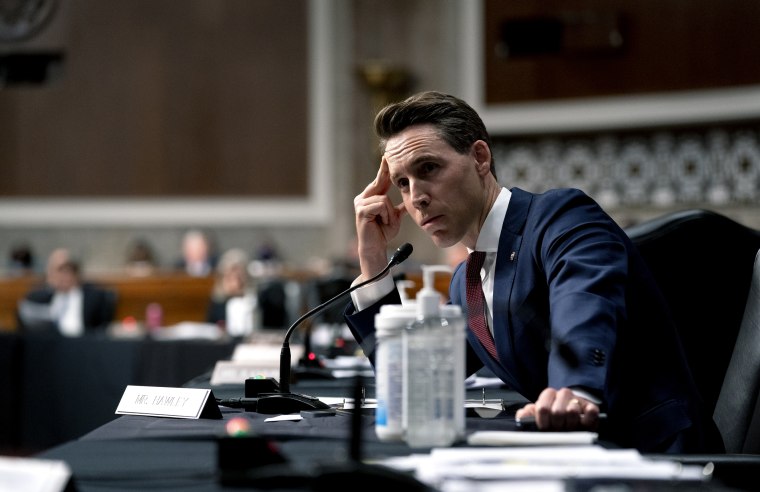Sen. Josh Hawley, R-Mo., will introduce legislation Wednesday that may be more likely to garner support from Democratic colleagues across the aisle than from fellow Republicans.
Hawley’s bills — the Fair Prescription Drug Prices for Americans Act and the Ending the Prescription Drug Kickback Act of 2023 — would penalize pharmaceutical companies for selling drugs in the U.S. at prices that exceed their average costs across the U.S.’s peer nations in the Group of Seven major industrial countries, as well as entirely ban prescription drug rebates in both federal and private health plans.
In short, the two measures run counter to traditional conservative economic theory and could end up creating strange bedfellows with some of the Senate’s more liberal-leaning members.
“My view — and I’ve had this view for years now — is that American patients should not be bearing the cost of cheap drugs everywhere else in the world,” Hawley said in an interview. “And these pharma companies shouldn’t be able to make massive profits off the back of Americans who desperately need many of these drugs and products in order to live.”
The first bill says the retail list prices for drugs sold in the U.S. may not exceed the average costs they are sold for across Canada, France, Germany, Italy, Japan and the United Kingdom. The legislation would allow the secretary of health and human services to calculate the average cost across those countries annually and impose stiff fines on drugmakers who run afoul.
The second bill would remove safe harbor protections for prescription drug rebates that drug manufacturers and pharmacy benefit managers (known as PBMs) now have under a federal anti-kickback statute. It calls for insurance companies to ensure that PBMs do not receive any rebates from drug manufacturers for any prescription drug offered to its enrollees.
Despite having drawn bipartisan outrage over his infamous photo ahead of the Jan. 6 riot and his status as one of the most conservative senators on social issues, Hawley has advanced legislation with Democrats about tech and China while striking a populist tone that has earned him favor among Republican lawmakers aligned with former President Donald Trump.
Hawley introduced legislation this year to cap the monthly price of insulin at $25, and last year he was one of seven GOP senators to vote to lower the cost of insulin as a provision of the Inflation Reduction Act. (Senate Republicans ultimately voted the measure down, and Hawley did not vote for the legislation, a key part of President Joe Biden’s agenda.)
Asked how he would get fellow Republicans on board with his legislation, Hawley said, “There is no reason that anybody ought to be defending Big Pharma,” adding that major pharmaceutical companies told “flat-out lies” about the opioid crisis and are misleading Americans about how much they are charging for medicines.
“So my pitch to my fellow Republicans is listen, we need to be for people, not for pharma,” he said. “We need to be about helping patients be able to get affordable prices. And I have no interest in helping pharma further fleece these consumers to line their own pockets.
"And by the same token, I don’t have any interest in helping the big insurance companies keep their sweetheart deals with pharma, where they get these kickbacks for negotiating cheaper drug prices … and then passing on higher prices to consumers," he continued. "I think we should end that, too.”
Brian Newell, a spokesperson for PhRMA, the leading industry advocacy group, pushed back on Hawley's legislation.
"We agree there are people paying too much for medicines, but referencing prices set by foreign governments isn’t the answer," Newell said in a statement. "These foreign schemes that limit access to medicines are not ones we should copy if the aim is to ensure patients can get the medicines they need."
Newell added that PhRMA agrees the rebate system "is broken, and we can fix it by making sure the savings health plans and middlemen receive go to directly to patients who need lifesaving medicines."
The Inflation Reduction Act, which passed the Senate on a party-line vote, included a number of drug pricing provisions, among them capping out-of-pocket spending for Medicare Part D enrollees and requiring the federal government to negotiate prices for some drugs covered under Medicare. The measure limits the monthly cost of insulin to $35, but only for those who are covered by Medicare. It also further delayed implementation of a drug rebate rule issued by the Trump administration that would have similarly banned the rebates Hawley is targeting, but only for Medicare.
The effect of those provisions would increase premiums for most Medicare Part D enrollees, the Kaiser Family Foundation reported, citing the nonpartisan Congressional Budget Office and the Health and Human Services Office of the Actuary.
Lucas Kunce, a Democrat who is challenging Hawley in his 2024 re-election bid, pushed back on Hawley's proposed legislation, saying the senator's "latest campaign prop would put Europe in charge of how much Americans pay for essential drugs." Kunce also criticized Hawley for voting against the Inflation Reduction Act.
"All 535 members of Congress have campaigned on cutting drug costs," he said in a statement. "But on its final vote in 2022, the IRA became the first law to pass in a generation that actually did something about it, with an insulin cap and negotiation for some drug prices — and Josh Hawley voted 'No.'"
As for his legislation, Hawley said he has discussed his proposals with Democrats, including his cap on insulin costs, and believes he can get support across the aisle.
“I hope that we can address all of them,” he said. “And I hope that will be bipartisan.”

